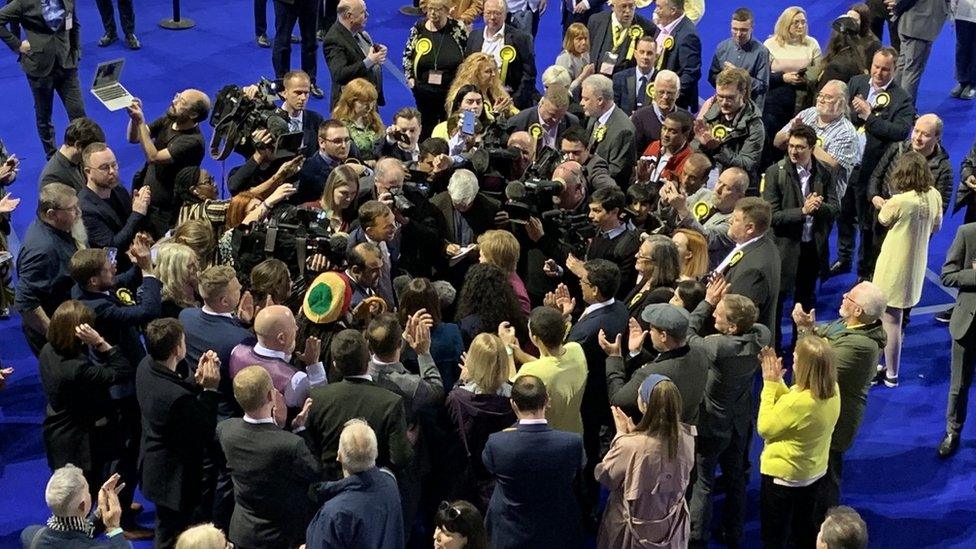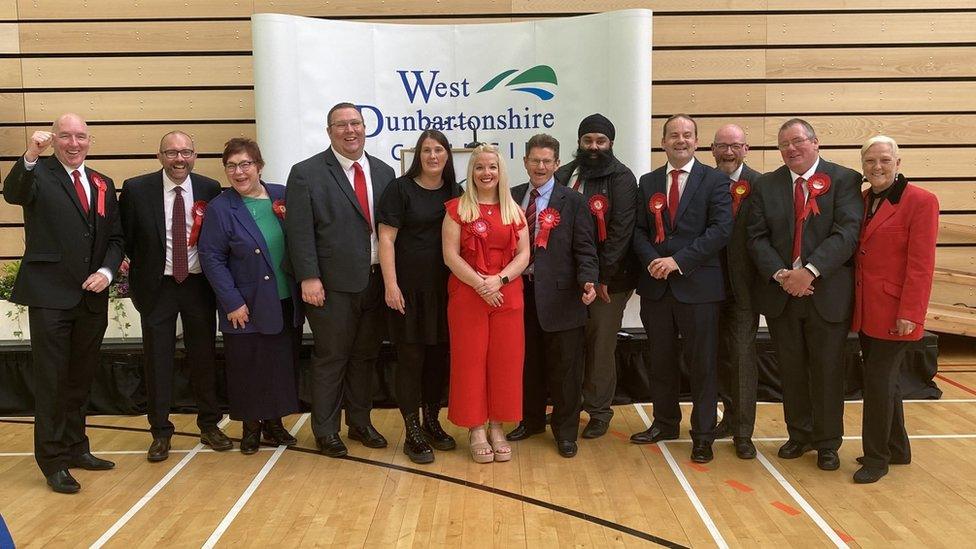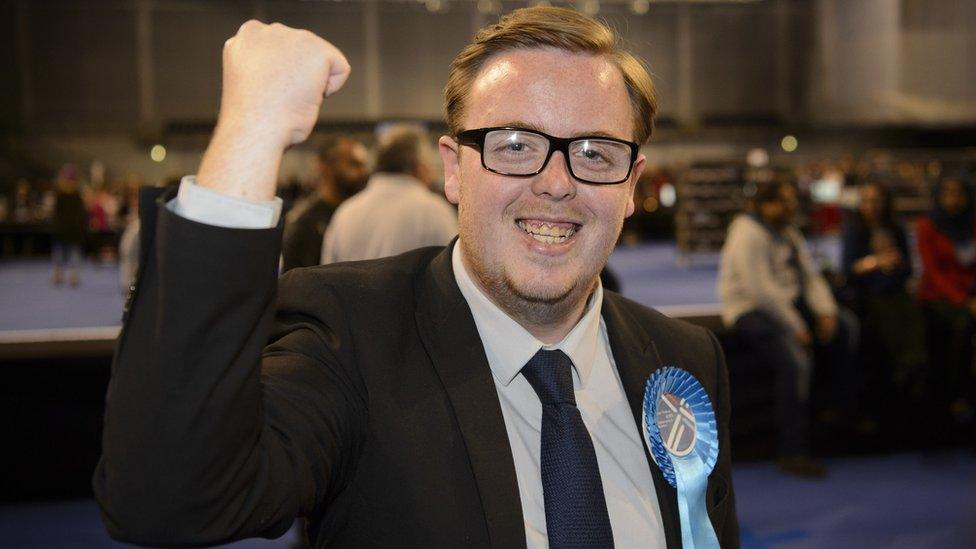SNP maintains position as largest party at Glasgow City Council
- Published

Nicola Sturgeon celebrated with SNP councillors at the Glasgow count
The SNP has held its position as the largest party at Glasgow City Council, Scotland's biggest local authority.
Nicola Sturgeon's party took 37 seats while Scottish Labour took 36.
Council leader Susan Aitken retained her Langside seat but lost her majority of first preference votes to Holly Bruce from the Scottish Greens.
In nearby West Dunbartonshire, Scottish Labour won control of the council. The council previously had no overall majority but was led by the SNP.
The final result in Glasgow was 37 seats for the SNP, a drop of two, and a five-seat gain for Labour at 36.
The Scottish Greens gained three new seats taking their total to 10, while the Scottish Conservatives lost six seats leaving them with two.
Scotland's first minister hailed a "seismic" result, external after Tory councillor David Meikle - the husband of former MP Natalie McGarry - lost his seat in the Pollokshields ward to the SNP.
Ms Sturgeon said on Twitter: "National/city trends aside, this result is seismic. For years, Pollokshields was the only Tory seat in Glasgow and it seemed we would never take it."
She also praised, external Roza Salih, the first refugee to be elected to Glasgow City Council.
The 33-year-old SNP councillor for Greater Pollok has campaigned for the rights of refugees since she was a teenager when she helped form the Glasgow Girls protest group, which later inspired a BBC musical drama.
In Glasgow's east end, the council's Scottish Conservatives leader Thomas Kerr retained his seat in Shettleston. He defied the odds to gain the seat in the deprived area in 2017, when he was a 20-year-old PR and advertising student.
In that ward two Labour councillors were voted in at the expense of the SNP, which lost one of its two seats.
'Rubbish in our streets,'
Leader of the Glasgow Labour group Malcolm Cunning was voted in on first preference in the Linn ward.
Mr Cunning said the results indicated the people of Glasgow were seeking change in their council, adding the city under the SNP's leadership had become a "mess".
He said: "I have seen throughout the election there is a particularly Glasgow phenomenon going on and that is about the state of the city. That is about the rubbish in our streets, bin collections missed, potholes, and simple mess that the city has developed over the last five years."
Anas Sarwar, leader of Scottish Labour and MSP for Glasgow Central, congratulated the new councillors, saying on Twitter: "After a tough decade, finally a day to cheer, external."
The Scottish Green party took a record 10 seats in the election, including the city's first trans councillor.
Elaine Gallagher, a former co-convenor of the Rainbow Greens group, won a seat in the Southside Central ward, replacing SNP councillor Mhairi Hunter.

Labour now has 12 councillors in West Dunbartonshire
Dumbarton Labour MSP Jackie Baillie tweeted that she was "delighted" with the result, external in West Dunbartonshire, where 12 of the 22 seats on the council were won by Scottish Labour.
"All of the candidates we stood were elected," she wrote, adding her thanks to party leader Anas Sarwar for his support."
The SNP had previously been the largest party and had formed the administration. Former council leader Jonathan McColl retained his SNP seat for Lomond.
Scottish Labour gained four council seats, the SNP won nine, down one, and the Conservatives lost both their seats. A Residents Association candidate won the remaining seat.
In 2017, no party won a majority in any of Scotland's 32 councils, which are selected using the single transferable vote system.
Uncontested seats
Inverclyde, home to the troubled Ferguson shipyard, saw gains for both the SNP and Labour from their positions on 2017. But two Alba councillors, who had defected from SNP since the last election, were not re-elected and their seats were retaken by SNP candidates.
Ward one in Inverclyde was one of only eight in Scotland that stood uncontested, and returned one candidate each for SNP, Scottish Labour and the Scottish Conservatives.
Labour group leader Stephen McCabe hopes to form another minority administration.
North Ayrshire had no overall majority but keeps the SNP as the largest party despite two gains for the Tories. Arran returned its Conservative councillor with a 19% increase in support while the SNP vote dropped by 14%.
BBC Scotland political editor Glen Campbell said this could reflect local concern over ferry services for the island.
Political parties were also unable to gain an overall majority in the other councils in the West of Scotland.
East Renfrewshire Council, which was run by an SNP/Labour/Independent administration, declared a close result, with the SNP taking six of 18 seats. Labour and the Conservatives each took five seats, a gain of two for Labour and a two-seat loss for the Conservatives.
The SNP remains the largest group on Renfrewshire Council, up two to 21, with Labour also gaining two seats to take second place with 15. The Scottish Conservatives won five seats, down from eight.
In North Lanarkshire, the SNP is still the largest group after gaining three seats to hold 36 of the available 77. Labour kept 32 seats while the Conservatives lost half of its previous 10 seats.
The SNP gained one seat to remain the largest party in South Lanarkshire Council with 28 of the 64 seats. Labour gained one seat to take 23.
East Dunbartonshire Council has one more SNP seat but still no party in overall control. The SNP has eight of the 22 seats, with the Liberal Democrats at six.
The SNP remains the largest group on East Ayrshire council with 14 of 32 seats. Labour took 10 seats and the Conservatives four.
In South Ayrshire, the Scottish Conservatives lost two seats but remains the largest party with 10 councillors. The SNP keeps nine seats, Labour remains on five and there are four independent councillors, up two from 2017.
The SNP remains the largest party on Argyll and Bute Council with 12 of the 36 seats.
- Published7 May 2017
